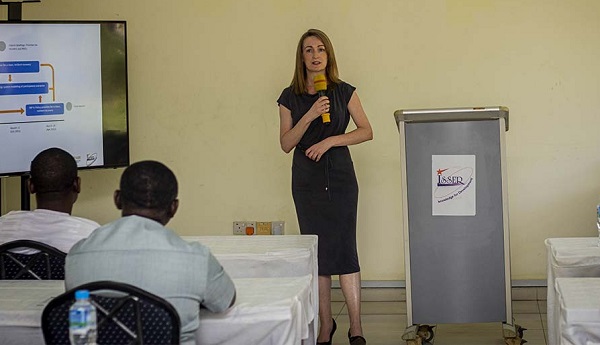
ISSER advocates use of electricity for cooking and transportation ...As Green recovery agenda
The Institute of Statistical Social and Economic Research (ISSER) of the University of Ghana (UG) is advocating the mass use of electrical appliances such as stoves or cookers to help the country reduce emissions drastically and promote just energy transition.
Advertisement
ISSER has thus called on the Ministry of Environment, Science, Technology and Innovation (MESTI) to lead the way in developing technologies that would effectively promote the use of electricity for clean cooking and address transportation needs as part of the green agenda for the country.
It said, for instance, in pursuance of promoting electricity for cooking and for mass transport to boost green development, a harmonious strategy was needed to ensure that the electricity needs of green industries were not compromised.
To achieve this, ISSER called for inter-institutional collaboration through cross-sector harmonisation of policies and the green economy paradigm as a prerequisite to fostering green growth.
This recommendation formed part of recommendations in a project report jointly initiated by the University of Ghana through ISSER, University College London, and the Zambia Institute for Policy Analysis and Research.
Project focus
As part of the project, the research team analysed stakeholder views on what a green recovery from COVID-19 could look like, co-developed future economy-wide scenarios with these stakeholders, analysed the energy system implications using quantitative models and developed recommendations for policymakers.
The Ghana report, named “Greening the Social and Economic Recovery In Ghana”, recommends adopting a blended scenario or decarbonisation pathway based on the country’s economic situation -- where the decision is taken to continue to invest in fossil fuel industries in the short term while increasing investment in green initiatives in the medium to long term, using resource taxes to ensure that the wealth is spread fairly and to generate funds for public investment in crucial social services.
An Associate Professor at the University College London, Dr Julia Tomei, explained that the project, which was conducted in the wake of the COVID-19 pandemic in 2020, aimed at finding holistic solutions to the existing pandemic and economic recovery in Ghana and Zambia.
Other Trending Stories
Efficient use of electricity
A senior research fellow at ISSER, Dr Simon Bawakyillenuo, presenting the findings at the launch of the report, noted that for the country to achieve its green recovery agenda and reduce emissions, there should be a coherent inter-sectoral strategy developed to have sufficient low carbon-electricity for both cooking and transport needs.
Talking about the effectiveness of using electricity as a green policy, Dr Bawakyillenuo said the E-pressure cooker, for instance, was an example of an efficient way of using electricity for cooking affordably.
“You say you want to reduce emissions; yet, we are emphasising so much on the use of LPG. If we want to say clean cooking, then we have to think about how we establish harmony between how we reduce the use of LPG and ensure that we have more on the electricity side.
“We have a technology called the E-pressure cooker. When you plug it, it just draws a little electricity but the pressure is what is used to cook the food,” ISSER’s Senior Research Fellow said.
He noted that although the statistics showed that only one per cent of the population used electrical gadgets for cooking, this statistic was underreported because more people were using electrical gadgets for cooking in different ways that were not considered to be part of the Ghanaian way of cooking thereby affecting the statistics.
He, however, acknowledged that such an initiative would need large investment for providing access to green energy over the decades, particularly in terms of electricity generation for which there was a need for growth in electricity generation through renewable energy such as solar and wind which were more cost-effective than a conventional fossil-based generation.
Restructure Obaatanpa Care programme
Among the other recommendations, the report also called for the restructuring of the COVID-19 recovery policies, especially the Ghana CARES Obaatanpa Programme, to have a greater focus on green transformation.
“This restructuring process is required because while the three-and-a-half-year GH¢100 billion programme was set up to mitigate the impact of the COVID-19 pandemic and return the country to a sustained path of robust growth and to create a stronger, more resilient and transformed economy, it failed to address green businesses and green product development in its scope of actions,” it said.
Revamp BRT
The report also called for the revamping and sustaining of existing green transport initiatives, including the Bus Rapid Transport (BRT) initiative, which still required dedicated bus lanes and investment to enable the electrification of rail and road transport.
Strengthen MMDAs
It also called for the strengthening of administrative and fiscal decentralisation to metropolitan, municipal and district assemblies as they had a key role to play in the shift to a greener economy but would still require sufficient resources to execute these roles.




